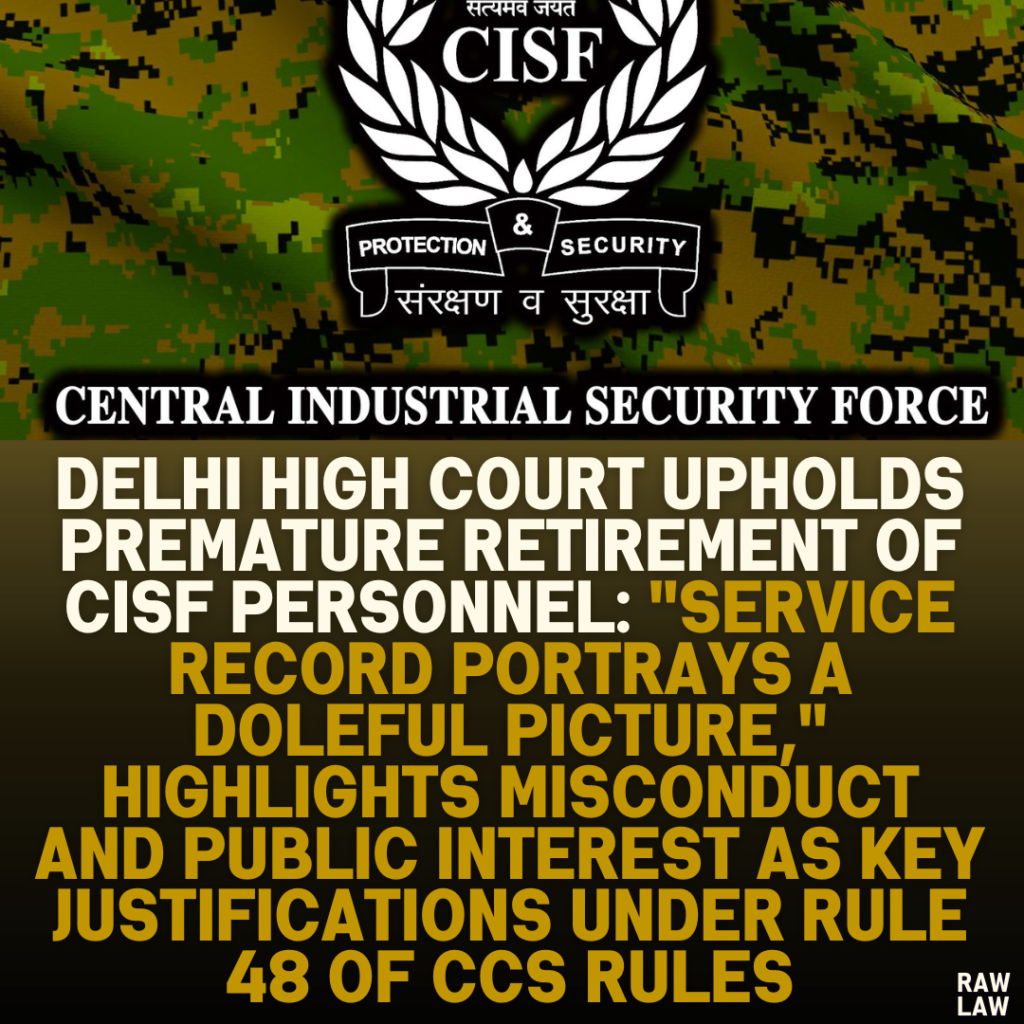Court’s Decision:
The Delhi High Court dismissed the writ petition filed by the CISF personnel challenging his premature retirement. The court held that the retirement order, passed under Rule 48 of the Central Civil Services (Pension) Rules, 1972, was legally valid and based on an assessment of the petitioner’s entire service record. It concluded that the petitioner’s conduct made him unsuitable for continued service, thus justifying the decision in the public interest.
Facts of the Case:
- Petitioner’s Background:
- The petitioner joined the Central Industrial Security Force (CISF) in 1986 as a Constable and was later promoted to Head Constable in 2008.
- After completing 30 years of service, he was subjected to a Superannuation Review under Rule 48 of the CCS Rules.
- Findings of the Review Committee:
- The Review Committee, based on his service record, recommended premature retirement, concluding that the petitioner was “not fit for retention in service.”
- Consequently, the petitioner was retired on 16th July 2016.
- Legal Challenge:
- The petitioner challenged the retirement order, arguing that it was arbitrary, unreasoned, and contrary to Rule 56(j) of the Fundamental Rules.
- He alleged procedural lapses, including the lack of a show-cause notice, and claimed that minor penalties for past misconduct could not justify retirement.
Issues Raised:
- Whether the retirement order complied with Rule 48 of the CCS Rules and Rule 56(j) of the Fundamental Rules.
- Whether the petitioner’s misconduct justified the premature retirement in public interest.
- Whether procedural safeguards, such as issuing a show-cause notice, were violated.
Petitioner’s Arguments:
- Procedural Flaws:
- The petitioner argued that he was prematurely retired under Rule 56(j), which requires the employee to attain at least 55 years of age. As he had not reached this age, the decision was unlawful.
- The order was arbitrary and non-speaking, as no reasons were provided.
- Lack of Notice:
- The petitioner contended that he was not issued a show-cause notice, violating principles of natural justice.
- Nature of Penalties:
- The petitioner argued that the minor penalties imposed during his career were insufficient to warrant compulsory retirement, especially considering his otherwise long and dedicated service of 30 years.
- Personal Impact:
- The petitioner emphasized his personal circumstances, including his dependent family members, to argue for a sympathetic review of his case.
Respondent’s Arguments:
- Legal Authority:
- The respondents argued that Rule 48 of the CCS Rules allows premature retirement after 30 years of qualifying service if deemed in public interest.
- Under Rule 56(j), the Competent Authority has absolute discretion to retire employees found unsuitable for retention.
- Assessment by the Review Committee:
- The petitioner’s service record, including nine penalties for misconduct, showed a consistent pattern of indiscipline and inefficiency.
- The Review Committee’s recommendation was based on a comprehensive evaluation of the petitioner’s service history.
- Judicial Precedents:
- The respondents cited cases such as Union of India v. Col. J.N. Sinha and State of Gujarat v. Umedbhai M. Patel, which uphold the discretionary power of authorities to retire employees in public interest.
- No Mandatory Show-Cause Requirement:
- The respondents contended that issuing a show-cause notice is not required under Rule 48 or Rule 56(j), as the decision is based on the service record and public interest.
Analysis of the Law:
The court conducted a detailed analysis of the legal provisions and relevant precedents:
- Rule 48 of the CCS Rules:
- Allows premature retirement of government employees after 30 years of service if it serves the public interest.
- Requires the issuance of three months’ notice or payment in lieu.
- Rule 56(j) of the Fundamental Rules:
- Empowers authorities to compulsorily retire employees upon reaching a specific age (50/55 years) or completing 30 years of service, whichever comes earlier.
- Judicial Precedents:
- In Col. J.N. Sinha v. Union of India, the Supreme Court emphasized that Rule 56(j) balances public interest with the rights of employees and allows for retirement of inefficient or unfit personnel.
- In State of Gujarat v. Umedbhai M. Patel, the court laid down principles for compulsory retirement, including the consideration of the entire service record and ensuring the decision is in public interest.
Precedent Analysis:
- The court reiterated that compulsory retirement is not punitive but a measure to improve administrative efficiency.
- It cited judgments emphasizing the limited scope of judicial review in such cases, restricted to examining whether the decision was arbitrary, mala fide, or based on irrelevant considerations.
Court’s Reasoning:
- Validity of the Retirement Order:
- The court clarified that even if the order incorrectly cited Rule 56(j) instead of Rule 48, it did not invalidate the decision, as both rules allow for premature retirement in public interest.
- Service Record and Misconduct:
- The petitioner’s record revealed multiple instances of serious misconduct, including intoxication while on duty, allowing unauthorized entry during a security drill, and dereliction of duty.
- These actions demonstrated a lack of discipline and commitment, making him unfit for continued service.
- Procedural Compliance:
- The court held that a show-cause notice was not mandatory under the rules. The Review Committee’s decision, based on a thorough assessment of the service record, fulfilled the procedural requirements.
- Public Interest:
- The court concluded that the decision to retire the petitioner was in public interest, as his continued service would compromise the efficiency and discipline expected from CISF personnel.
Conclusion:
The court dismissed the writ petition, holding that the premature retirement was lawful, justified, and based on sufficient material. It found no arbitrariness or procedural lapses in the decision-making process.
Implications:
This judgment underscores the discretionary power of authorities to retire employees in public interest, particularly in cases involving armed or disciplined forces like the CISF. It reaffirms the principle that maintaining discipline and integrity in public services is paramount, and decisions supported by sufficient material will not be interfered with lightly by courts.
